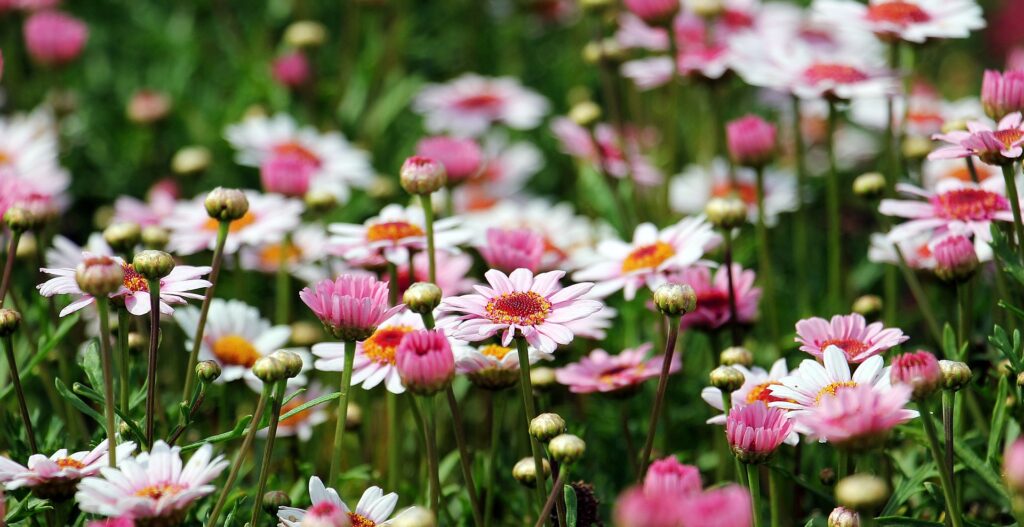Benefits of a Flower Garden
Last updated: February 11, 2026
Typically, we plant flowers in our gardens as a hobby, to make them appear nice, or simply because we like them. Others might believe that growing flowers is simply a waste of our useful space or land. In addition to dispelling all of these myths and misconceptions, there are deeper motives for keeping flowers in our gardens. Unexpectedly, they can serve as ground covers, fertilizers, pesticides, weed killers, etc.
Every family can profit both somewhat and significantly from the straightforward process of planting, caring for, and nurturing flowers. You may reap the educational, social, environmental, and health benefits of planting flowers with only a little soil, seeds, and persistence. Flower gardening has many advantages, from the environmental advantages of flowers to the advantages of learning how to grow.
Do you have any doubts about whether or not you should start a flower garden? It’s a simple task that both rookie and experienced gardeners can enjoy: planting flowers and making use of the benefits of a flower garden. On a day with a high chance of rain and at a moderate temperature, planting flowers is best.
Although early fall is also a good time to plant perennials, planting flowers is most common in the spring. The benefits of a flower garden include improved emotional well-being, exercise for the gardener, and environmental advantages like erosion control and pollinator attraction.

Several Reasons to Love Flower Gardens
In addition to attracting pollinators and giving the gardener a pleasurable workout, planting flowers have a variety of advantages, including aesthetic appeal, mood improvement, erosion management, and aesthetic appeal. Here are several benefits of a flower garden:
- Planting Flowers For Visual Appeal
Any landscape will get color and visual intrigue by adding flowers. The appeal of outdoor spaces is increased by adding a pop of color among the trees or shrubs. Additionally, planted flowers give gardeners access to blooms that are suitable for cutting and bringing indoors or giving as gifts throughout the blooming season, saving them money that would otherwise be spent at a florist. This may be very economical.
See Also: Best Flowers For Gardening
Flowers brighten up private spaces, neighborhoods, and highways with colors ranging from white to deep red, blue, or purple. A community’s shared spaces become more attractive when flowers are planted there, and this fosters a sense of pride and responsibility among the locals.
- Planting Flowers as Exercise
Planting flowers can have a positive physical impact on gardeners. Gardening is a good workout that targets a variety of muscle groups and improves flexibility. Additionally, it is a skill that practically anyone of any age can learn. While bending and reaching stretch the body and help the muscles become more elastic, digging and planting burn calories and use muscles. Additionally, the exercise burns calories at a rate of 57 to 135 calories per 15 minutes of exercise. Depending on the gardener’s weight, different amounts of calories are burned.
- Planting Flowers for Cleaner Air
Like other plants, flowers have a variety of advantages for the environment. Pollutants are removed from the air by plants. The leaves of the flower take in carbon dioxide and release oxygen during the process of photosynthesis. Furthermore, flowerbeds can help to retain soil in its appropriate location, preventing erosion and flooding. This makes planting flowers both a sensible and attractive decision.
- Using Flowers to Attract Pollinators
Additionally beneficial to the environment is planting flowers. The majority of flowers draw beneficial pollinators, like bees, butterflies, moths, and other pollinators, which are essential to our survival. Flowers come in a variety of hues and forms, and they are attractive to a wide range of beneficial insects. Some flower varieties, including petunias, hollyhocks, and bee balm, will even draw hummingbirds.
- Health Benefits of Growing Flowers
Growing flowers in a garden allow for the body to be strengthened, which has many positive effects on health.
The quantity of physical activity that people engage in each week is well below the amount advised by the Centers for Disease Control due to the sedentary nature of many occupations and pastimes. Adults ought to work out for at least two hours and thirty minutes every week. Children should engage in physical activity for at least an hour each day.
Each of these daily physical activities, planting, weeding, and watering requires some physical effort. Maintaining a weekly exercise schedule lengthens life by preventing disease and bolstering the muscles and bones. People can fulfill the majority of their requirements for weekly physical activity by gardening.
The unnaturally pale complexion and a disconcertingly low level of vitamin D in the body are further side effects of today’s sedentary lifestyle. UV rays that contact the skin cause the body to produce vitamin D. Both children and adults need vitamin D in order to absorb calcium.
All of the milk you make yourself and your children drink is meaningless without vitamin D. Your family will have weak bones and teeth as well as alarmingly high dental and medical expenses if you don’t manufacture vitamin D through outdoor activities like gardening.
The therapeutic effects of energizing natural smells and vibrant shapes may also be to your liking.
- Social Benefits of Flower Gardening
As a communal effort, growing a flower garden will promote interpersonal communication and promote close relationships. A natural method to engage in exercise and conversation at the same time is to work together to improve the environment.
Gardeners will see an improvement in their social lives when they engage in gardening as a group activity with other family members or friends. Gardening is a fun and instructive family activity at a time when most family activities include idly watching television or playing video games. You might also observe a strengthening of family relationships when the season changes and the plants start to bloom. This is in part because when you are gardening, you are not isolating one another but rather cooperating to achieve a common objective.
Essential Benefits of a Flower Garden
A contented and productive team is essential for keeping a competitive edge in today’s corporate environment. With ongoing variations in unemployment, consumer confidence, and other economic conditions, this might be challenging to do. Speaking of sharing, gifting someone flowers has always been a wonderful method to express how much they mean to you and create close bonds.
Top 5 benefits of a flower garden:
- Great for Bees and Butterflies
Butterflies and honey bees adore flower gardens. The main source of nectar for these amazing insects to consume is flowers. They unintentionally gather pollen from the stamen while extracting the nectar (the male reproductive organ of the plant). The pollen is then dropped into the pistil, which houses the female reproductive organs (known as ovules) when they go on to another flower of the same species.
Because it enables plants to produce fruit and seeds, pollination is essential to agriculture and food production. Without pollination, the planet would be in serious problems because we wouldn’t be able to grow food.
- It is Not Expensive
Starting a flower garden can be quite affordable, which is one of its best features. One of those pastimes where you can spend money on ostentatious tools and pre-started flowers but don’t have to is gardening. By being a little more frugal, you can save money.
Utilize the equipment and tools you already have in your garage or workshop. The quality of your garden won’t be much impacted by your equipment. Finally, invest time to save money. Starter plants are far more expensive than seeds. Although starting and transplanting them will require a little more work, if you are willing to put in the time before it is actually time to plant outside, you can save a ton of money and grow whatever you want!
- Environmental Friendly
For a number of reasons, planting a flower garden is good for the environment. The first explanation is that flowers use photosynthesis to create chlorophyll. Plants take up carbon dioxide from the atmosphere and expel oxygen during photosynthesis. This results in cleaner, oxygen-rich air and lower CO2 emissions (however small the impact may be).
The roots of flower gardens can also serve to maintain the soil, which is another way they benefit the environment. Because the roots operate as a foundation to provide structure underground, this lessens soil erosion. In terms of sustainability and land preservation, this is a crucial factor.
- Health Benefits
Planting a flower garden has numerous health advantages as well. First off, gardening is a fantastic kind of exercise, particularly for middle-aged and older people. The bending, lifting, and stretching involved in gardening, help with strength and flexibility. weeding, watering, edging, and digging all add up to an excellent workout!
Second, gardening actually strengthens your immune system. You put yourself at risk for exposure to common bacteria and microorganisms by working in and around the soil. As a result, your body might produce antibodies to strengthen its immune system. So don’t be reluctant to dirty your hands!
Finally, gardening is fantastic for your mental and emotional well-being. A flower garden’s lovely hues and enticing aromas can uplift your spirits and promote relaxation.
- Joy and Beauty
It may seem apparent, but stunning fresh flowers can make you and everyone else around you happy. Your garden will be more attractive when you plant flowers for the community to enjoy. You can also make bouquets for the significant people in your life by cutting flowers. A floral arrangement is sure to evoke happy feelings and even assist reduce stress for the recipient and the giver, whether it be for special events or a straightforward surprise. Making someone’s day with freshly picked flowers is simple.
According to studies, the mere presence of flowers can help people connect on a more intimate level, regardless of whether they are giving or receiving them. People who were surrounded by flowers demonstrated stronger ties to their loved ones.
Conclusion
Planting flowers may be a rewarding and enjoyable social activity. It can be utilized as a way to strengthen family ties and challenge the mind. Plant growth results in a strengthening of the body. You’ll be pleased to learn about flowers’ advantages for the environment and feel good about contributing a tiny bit of good for the environment.
FAQ
What do you feel is special about a flower garden?
Flower gardening has the undeniable advantage of requiring you to leave your rocking chair, put an end to your addiction to soap operas, and venture outside.
How do flower gardens help the environment?
The amount of oxygen that different kinds of trees and plants create increases dramatically when you put them in your garden. This assists in reducing the damaging air pollution that is emitted from the engines of our vehicles and other machinery.
How does a flower make you feel?
Flowers have a protracted mood-enhancing impact. Particularly, after getting flowers, people show a stronger sense of happiness and life satisfaction. Flowers foster close relationships.


